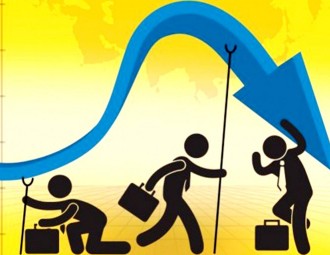Leu Marholin: In 2017, the probability of economic growth is close to zero

In 2016, Belarusian authorities were expecting growth, too. However, the economy is going down.
While the Belarusian economy is falling, the country's leadership forecasts economic growth in 2017.
Aliaksandr Lukashenka signed the decree No. 359 "Concerning the main priorities of the monetary policy of the Republic of Belarus for 2017.”
The document provides for the economic growth by 1.7%.
The main objective of monetary policy is to reduce inflation to 9%. Average broad money supply growth is projected at 12-16%.
While the Belarusian economy is falling, the country's leadership forecasts economic growth in 2017. Where has the Belarusian leadership found the sources of growth?
The EuroBelarus Information Service talked with economist Leu Marholin about it.
- The probability of such an outcome is close to zero. Although the projected growth of 1.7% is within the statistical error, even that won’t happen. Economic growth requires certain reasons: either foreign or domestic investment, or a sharp increase in traditional markets; while we have neither.
- Well, if the parameters of growth are taken into account, it means that the official Minsk nurtures some secret hopes...
- The growth was also forecasted for 2016, while on the contrary, the economy is declining.
Without additional investment, the authorities can only rely on the recovery of the Russian market, the sharp rise in oil prices, and that the Russian market will become available for Belarusian tractors and MAZ again.
- However, the world banks forecast sharp decline of the Russian ruble in 2017.
- Indeed, there are no reasons for the rise of economy neither in Belarus nor in Russia. Moreover, now we are considering the possibility that the United States can increase sanctions against Russia because of the events in Syria – in such circumstances, we can only hope for a miracle.
- Labor productivity growth is projected at 1.8% of the previous year. At the same time it will exceed the growth of real salary (1.5%) and real disposable income of the population (1.3%). Does this mean that the Belarusians will have to work harder for less money?
- This means that there will be further cuts in the guise of optimizing the workforce. Labour productivity growth is possible due to two factors: either the smaller number of workers produce the same volume of production, in which case the volume won’t increase; and if the volume growth is planned, then additional investment is needed.
Belarusian leadership operates such abstract concepts that they are very difficult to comment on.
- Are there any external loans in sight?
- The only hope (which is half-fantasy) is that it will be possible to negotiate with Russia: if we agree on the gas prices suggested by Moscow, and receive a Russian loan to pay for gas in return. I see no possibilities for the growth of our gold reserves today.
-
03.01
-
07.10
-
22.09
-
17.08
-
12.08
-
30.09










































